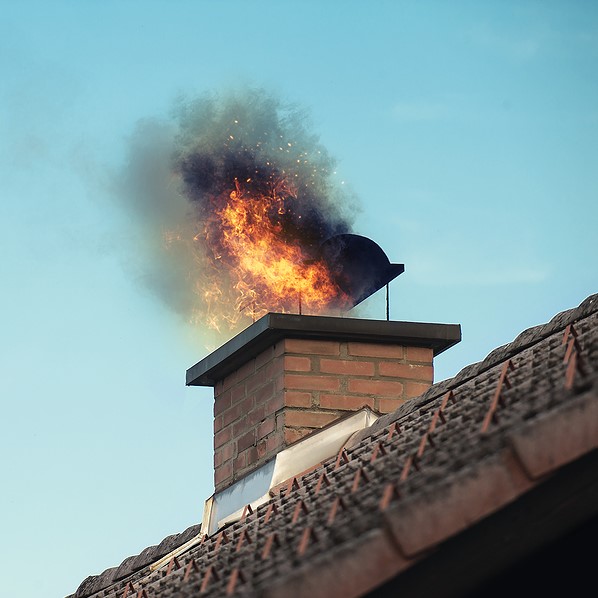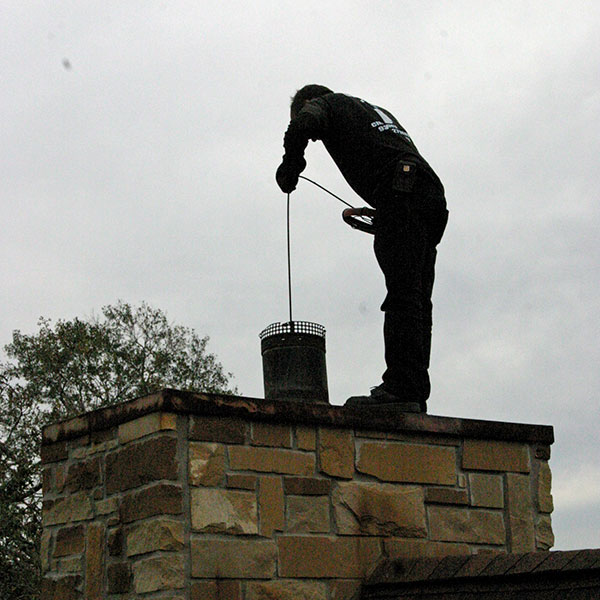The Dangers of Chimney Fires and Tips to Prevent Them
 Chimney fires are dramatic, destructive events that should not be ignored but, instead, should be actively prevented. Statistics show that more than 25,000 chimney fires occur annually in the US, and those fires are responsible for $1.2 million in property damage each year. Below, learn more about chimney fires, their most common causes, and tips to prevent them.
Chimney fires are dramatic, destructive events that should not be ignored but, instead, should be actively prevented. Statistics show that more than 25,000 chimney fires occur annually in the US, and those fires are responsible for $1.2 million in property damage each year. Below, learn more about chimney fires, their most common causes, and tips to prevent them.
What is a Chimney Fire?
The place for fires is in your fireplace or stove, not in the chimney flue. The flue’s functions include protecting combustible materials and preventing deadly combustion gases from entering the living area of your home. The flue is not the place for fires, and yet that is where chimney fires occur.
What Causes Chimney Fires?
The primary cause of chimney fires is creosote. A byproduct of combustion gases created by wood fires, creosote is a highly flammable tar-like substance that clings to the walls of the flue liner. The presence of creosote in the liner increases the risk of a chimney fire. A hot ember or spark can ignite creosote, resulting in a blaze inside the chimney. If the amount of creosote buildup is significant, it will continually fuel the chimney fire, likely destroying the liner and causing the blaze to rapidly spread into combustible parts of the home.
Debris inside of a chimney flue can also ignite and start a chimney fire.
How to Recognize When There is a Chimney Fire
It is not uncommon for occupants of a home to be unaware that there has been a chimney fire at their home. In fact, most chimney fires go undetected, according to the Chimney Safety Institute of America (CSIA). These types of chimney fires are often every bit as destructive as the more obvious kinds, such as those with characteristics described below. What makes the subtle chimney fires a bit more dangerous is the fact that they are undetected and the fireplace may be used without recognizing that serious damage has likely occurred and major repairs are needed immediately.
The following are among the signs of a chimney fire:
- A loud popping or crackling noise similar to a bonfire is coming from the fireplace through the flue.
- Thick, dense smoke is backdrafting into the fireplace or billowing out at the top of the chimney.
- Flames can be seen coming out of the top of the chimney.
- A roaring sound like an airplane or freight train can be heard from the chimney.
- An intensely hot, strong odor is detected.
If you see, hear, or recognize any of these things associated with a chimney fire, get everyone out of your house immediately and call 9-1-1.
 Tips to Reduce the Risk of Chimney Fires
Tips to Reduce the Risk of Chimney Fires
Controlling the amount of creosote in your chimney is one of the best ways to avoid a hazardous chimney fire. Creosote buildup can be reduced with the following strategies:
- Burn only properly seasoned firewood.
- Burn fires of the appropriate size for your fireplace.
- Ensure that there is a sufficient draft in the chimney when fires are burning.
- Schedule annual chimney inspections so that any damage in the chimney flue can be detected.
- Schedule chimney cleaning on a routine basis so that creosote buildup is kept to a minimum.
- Install a chimney cap with mesh so that leaves and other debris, as well as animals and their nests, are kept out of the chimney flue.
Contact Guardian Chimney Sweeps Today
Serving Conroe and the Greater Houston Area, Guardian Chimney Sweeps cares about helping Texans maintain a safe chimney system. We have also seen the damage that chimney fires can do, and we provide advice and services to help prevent these dangerous incidents from occurring.
If you need a chimney inspection, chimney liner repair or replacement, chimney cleaning, chimney masonry repair, flashing repair, chimney crown repair, or any other chimney sweep services, contact our friendly CSIA-certified chimney sweep experts at Guardian Chimney Sweeps. Schedule an appointment today by calling one of the numbers below:
Toll-free: (888) 306-6069
Conroe: (936) 271-9781
Houston: (713) 401-2011

 Tap to Call Now
Tap to Call Now